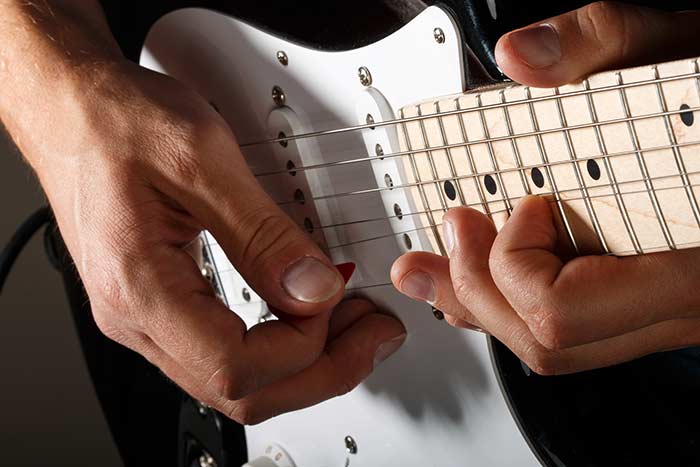Playing the guitar is an incredible journey filled with both highs and lows. However, many guitarists often face moments of frustration that can hinder their progress and enjoyment. In this article, we’ll explore effective strategies to help guitarists overcome these obstacles and keep the passion for playing alive.
Understanding Frustration:
Understanding frustration in the realm of guitar playing involves recognizing it as a natural byproduct of skill development. Guitarists often face frustration when tackling technical hurdles, experiencing creative blocks, or perceiving slow progress. Acknowledging these common sources of frustration is vital to addressing them effectively, enabling guitarists to approach their learning journey with resilience and a proactive mindset.

Set Realistic Goals
Setting realistic goals is a pivotal aspect for guitarists navigating through frustration. By defining specific, attainable objectives, such as mastering a chord progression or learning a new riff within a reasonable timeframe, guitarists can build a sense of accomplishment while progressing gradually. Realistic goals help in combating the overwhelming nature of learning an instrument, enabling players to track their advancements and maintain motivation. This approach also minimises frustration, as it encourages a steady yet consistent growth, fostering a more fulfilling and enjoyable journey in mastering the guitar.
Practice Regularly
Consistent practice forms the bedrock of skill development for guitarists experiencing frustration. By dedicating regular, structured practice sessions, musicians can overcome obstacles and enhance their abilities. The article underlines the importance of establishing a routine that suits the individual’s schedule and gradually increasing the intensity and duration of practice. Regular practice not only improves technical proficiency but also instills confidence and familiarity with the instrument. Additionally, it helps manage frustration by breaking down complex skills into manageable, digestible parts, fostering a sense of progress and accomplishment over time.
The real key lies in the words ‘digestible parts’! It is also super important to practice intentionally and with focus and to work on the HARD PARTS first! (Not just play what you can already play well!)

Embrace Mistakes
Understanding that mistakes are a natural part of skill development allows guitarists to adopt a growth mindset. By embracing errors, individuals can identify areas needing improvement, thereby refining their skills and advancing in their guitar playing journey. The article underscores the importance of not letting mistakes deter progress but rather viewing them as opportunities to grow and refine one’s abilities. Accepting mistakes fosters resilience, patience, and a willingness to experiment, ultimately aiding in overcoming frustration and evolving into a more proficient guitarist.
Explore Diverse Styles
By delving into diverse styles, guitarists can discover new techniques, chord progressions, and playing approaches, which not only enrich their skill set but also inject freshness and excitement into their practice sessions. Exploring various genres also fosters a deeper understanding of music and encourages creative experimentation. It helps to combat frustration by preventing monotony and offering a more dynamic and engaging learning experience. Additionally, it allows guitarists to find their unique voice and style, making the learning process more enjoyable and fulfilling.

Take Breaks
By taking periodic breaks, guitarists can prevent burnout, mental fatigue, and the overwhelming feeling of stagnation. These intervals of rest allow the mind to process and assimilate the information learned during practice, improving retention and overall performance. Breaks also serve as a moment to refresh and reset, enhancing creativity and motivation. They contribute to a more sustainable practice routine, preventing the buildup of frustration and ensuring a more enjoyable and effective learning experience. Overall, integrating breaks into practice sessions becomes an essential tool in maintaining enthusiasm and progress while mitigating the challenges that arise from the learning process.
Seek Guidance
Learning from someone with more experience can provide insights, techniques, and strategies that might not be easily accessible through solo practice. By seeking guidance, individuals can gain a fresh perspective, targeted feedback, and practical advice to navigate complexities, accelerate progress, and surmount obstacles. This proactive approach not only helps in overcoming frustration but also accelerates the learning process, fostering growth and skill development in a more efficient and effective manner.

Stay Patient and Persistent
Learning to play the guitar, like mastering any skill, requires time and consistent effort. The article emphasises the importance of understanding that progress might not always be immediately evident, but with unwavering persistence, improvements gradually manifest. Patience becomes a crucial companion in this journey, allowing guitarists to manage frustration by accepting the gradual nature of skill development. Through persistence, individuals can persistently work through challenging passages or techniques, slowly but steadily mastering them over time. This approach fosters resilience and a sense of accomplishment, ultimately contributing to a more satisfying and rewarding musical journey despite the inevitable setbacks and moments of frustration.
Conclusion:
Every guitarist faces frustration at some point. However, by implementing these strategies and maintaining a positive attitude, it’s possible to overcome these hurdles and progress on the path to mastery. Embrace the challenges, stay persistent, and keep strumming—because the rewards of mastering the guitar are truly worth the effort.
This article aims to provide practical strategies for guitarists encountering frustration, emphasising the importance of perseverance and a positive mindset in the pursuit of musical excellence.







